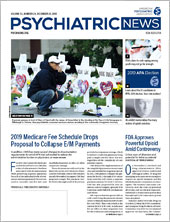It’s that time again: the APA election season is under way. The longstanding tradition of getting ready for the holidays and the coming new year also means that the candidates for the next group of APA’s elected leaders have begun campaigning hard for our vote. And despite that inevitable activity, here comes the now perennial question: why do so few APA members vote each year?
In preparing this column, I took a moment to review columns on APA’s election by several of my predecessors that appeared around this same time in their presidency. Each used a different approach to discuss the election, but the conclusion always seemed to be the same—APA members care about the organization, the profession and the issues we face, and those we serve. Nonetheless, it’s been over three decades since at least half the members voted in an election, and we have been trying to figure out why this is so. This is a particularly poignant concern this year because of the recent national midterm elections. At a time when our country is severely polarized and approaching problem solving from a partisan perspective, we saw an increase in the number of citizens exercising their right to vote for those to represent and lead them for the next few years. With regard to APA elections, clearly there must be a “tipping point” where members decide they can no longer sit on the sidelines and want to use their voice to accomplish the changes they wish to see. Maybe this will be the year.
Voting in APA elections is now easier than ever—click on a link in an email that APA will send to you in early January, vote for the candidates of your choice, and you’re done. To ensure you’ll get the email, make sure your contact information is up to date in your APA member profile. And if you don’t have an email address on file with APA, make sure your mailing address is correct so you’ll get a paper ballot (see instructions on how to access your profile at the end of this article).
This issue of
Psychiatric News provides information about APA’s 2019 election,
including the candidates’ names, photos, member class, and website addresses. Want to learn more about a candidate and his or her views on issues of importance to psychiatry? Visit that candidate’s website and read the candidate’s biographical and candidacy statements on APA’s election website. You can also watch video interviews of the candidates for president-elect and secretary. Take the time to learn about the candidates’ priorities and ask them about issues that are important to you. Moreover, most of the allied psychiatric associations invite candidates to write statements about issues of importance to their members or subspecialty concerns and publish them widely. And while we no longer have the candidate debates of years ago, many district branches and state associations invite candidates to speak at their meetings during the campaign season, and that’s also a good way to hear directly from each one.
The times in which we live and work demand that we become more involved in the process of selecting our future leaders. These are the folks that will help us shape and implement the national agenda to address the challenges facing psychiatry. From the overreaching regulations regarding programs, policy, and payments to achieving full mental health parity, reducing stigma, and educating the rest of medicine and the public about the significant scientific progress related to more effective therapeutic interventions, we have a lot of work facing us. Additional challenges related to the social determinants of mental health, impact of public unrest, climate change, association of mental illness with continuing acts of violence, and the impact of these traumas on overall health and well-being suggest that the need for psychiatric services may be greater now than ever before.
So, join with me and make your voice heard by voting in APA’s election. What you think is best for psychiatry’s future matters, so stand up, click (or check the box on the paper ballot), and be counted. We know that now, more than ever, every single vote is important. ■
To check your member profile, go to
psychiatry.org, log in, click on the arrow to the right of your name, and select “Member Profile.”

